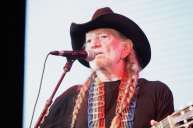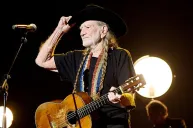Joseph Medicine Crow, the last war chief of Montana's Crow tribe, died in 2016 at the age of 102. A noted Native American historian, Medicine Crow was an indelible source of education and a heroic figure of the American west. Herman Viola, the curator emeritus at the Smithsonian Institution's National Museum of the American Indian, once said "When you meet Joe Medicine Crow, you're shaking hands with the 19th century."
Videos by Wide Open Country
Medicine Crow was the last surviving person to hear a first person account of the 1876 Battle of Little Bighorn. His grandmother's brother, White Man Runs Him, was a scout for Lt. Col. George Armstrong Custer.
A Life of Honor
Born Oct. 27, 1913, Medicine Crow grew up hearing stories of warriors as he visited with his elders in tribal sweat lodges. As a young man, he honored his ancestors with his own bravery. He joined the Army in 1943 and fought in World War II. As a scout for the 103rd Infantry Division, Medicine Crow secretly wore red stripes of war paint underneath his uniform. Beneath his helmet, he wore a sacred yellow-painted eagle feather given to him by a medicine man. Medicine Crow became a Crow war chief by completing the four required tasks: touching the enemy without killing them, taking a weapon from the enemy, entering an enemy camp at night to steal a horse and successfully leading a war party. During the war, Joseph Medicine Crow lead a war party into a Nazi camp and stole 50 horses.
In the video below, Medicine Crow recounts his time in World War II.
He also received the Bronze Star and the French Legion of Honor Chevalier Medal for his service in World War II.
Keeper of Memories
Medicine Crow was the first Crow Indian to graduate from college. He earned his master's degree in anthropology in 1939. He completed his thesis, "The Effects of European Culture Contact upon the Economic, Social, and Religious Life of the Crow Indians," at the University of Southern California.
Throughout his life, the Plains war chief worked tirelessly to speak for his tribe and record the history of his people. Medicine Crow wrote several books about Crow history and life on the reservation, including the children's book Brave Wolf and the Thunderbird.
Medicine Crow's writing inspired a younger generation of Crow tribe members to honor their heritage, serving as historian, educator and anthropologist for the tribe. In his house and garage, he kept boxes and boxes of old photographs and meticulously handwritten stories that had been passed down for generations.
Medicine Crow was also outspoken out about the lack of funding for Crow lands. He worked toward betterment of the Crow people living on 3,600 square miles of land on the Great Plains. He was also founding member of the Buffalo Bill Historical Center in Cody, Wyo.
In 2009, President Obama awarded Medicine Crow with the Presidential Medal of Freedom. President Obama called the hero a bacheitche, which means "good man" in Crow. At the ceremony, Medicine Crow swung his warrior coup stick and chanted a Crow war song.
Joseph Medicine Crow died on April 3, 2016 while in hospice care in Billings, Mont. He is remembered as a teacher, a brave warrior, a hero, a "bacheitche" and a bridge between centuries.
This article was originally published in 2017.



